Sinalo Jafta was born on December 22, 1994 in East London, South Africa. Jafta is one of the few athletes who excelled in a game other than cricket for a good part of her impressionable age and then decided to spend the rest of her life with bat and ball.
A university hockey player turned international cricketer, Jafta’s tryst with sports is simply enthralling. The wicket-keeper bat made her ODI debut against New Zealand in October 2016 and T20I debut against Pakistan in May 2019. In March this year, the 25-year old was awarded a national contract by Cricket South Africa ahead of the 2020–21 season.
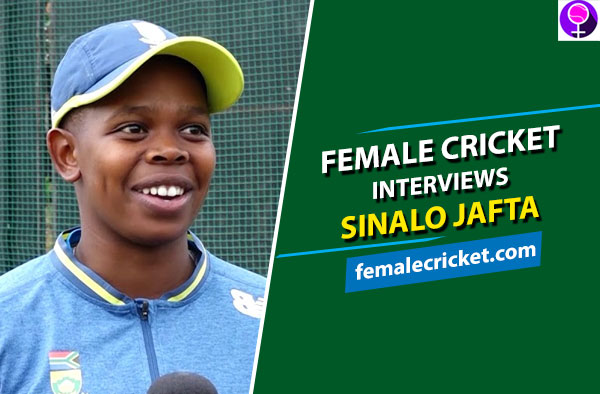
Team Female Cricket caught up with Jafta to understand more about her cricket journey.
Excerpts from the interview
Tell us about your childhood and your tryst with sports?
Right from my childhood, I wanted to become an athlete. I started playing hockey from a tender age of five. Hockey used to be a popular sport and many schools in my area encouraged hockey. I wanted to play hockey for South Africa in the Olympics. For a good part of my childhood I played hockey and only when I turned 13 I started playing cricket. My schedule used to be wake up at five in the morning, do the fitness, go for hockey practice, come back home at eight, have breakfast, and then go for cricket practice. It used to be a sports power-packed affair. Gradually I realized that it was mentally and physically difficult to manage both the sports. After juggling between the two sports, I made the tough decision of choosing cricket over hockey. My hockey coaches were disappointed. Interestingly, I entered the University as a hockey player with a scholarship because of my hockey credentials and passed out as an international cricketer (smiles). At present, I coach hockey and play cricket.
While growing up, did you have any role model in cricket?
Yes, I remember my mom used to be a big fan of Makhaya Ntini, and actually Ntini was the reason I started watching cricket.
I also liked watching Mark Boucher and the kind of blinders he took. Watching him grab those stunners even I wanted to catch those someday. So yes, Ntini and Boucher were my sources of inspiration.
Did you always want to become a wicket-keeper?
(Grins) Actually no, I wanted to be an all-rounder. I wanted to bowl quick like Ntini. And considering that I played hockey for good eight years before donning the cricketing hat, I thought my hand-eye co-ordination would help me in batting. So I actually wanted to become an all-rounder. I remember, during my early days in cricket, my coach once gave me the wicket-keeping gloves and I was like, no, I don’t want to keep wickets, I want to bowl fast. But as time passed, I realized that fast bowling was not my cup of tea and by the time I was 18, I made up my mind that wicket-keeping was the best I did so I decided to take it up full-time.
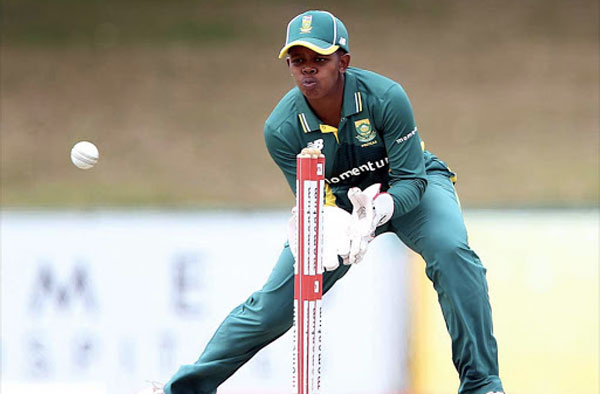
How is the domestic women’s cricket like in South Africa? How has it evolved over the years?
The domestic cricket also called provincial cricket in South Africa boasts of some good cricketers, both young and senior. There are some really nice bowlers who can bowl at a good pace consistently. Also, there are a few good wicket-keepers who are actually hockey players, just like me. My six years of provincial cricket helped me a lot to make it to the South African national side.
You made your international debut in 2016 when you were just 21 years old. How was that feeling? How did your friends and family react to the news?
It was amazing to get the national call and it felt as if all my hard work had fructified. However, the feelings were different among my family and friends. My mom was never a big fan of me playing sports. She just wanted to complete my university education and be a doctor or a lawyer (grins). So when I told her that I was going to make an international debut, she was like what’s that. My friends were surprised to know about my cricket progress since they knew that I always played hockey.
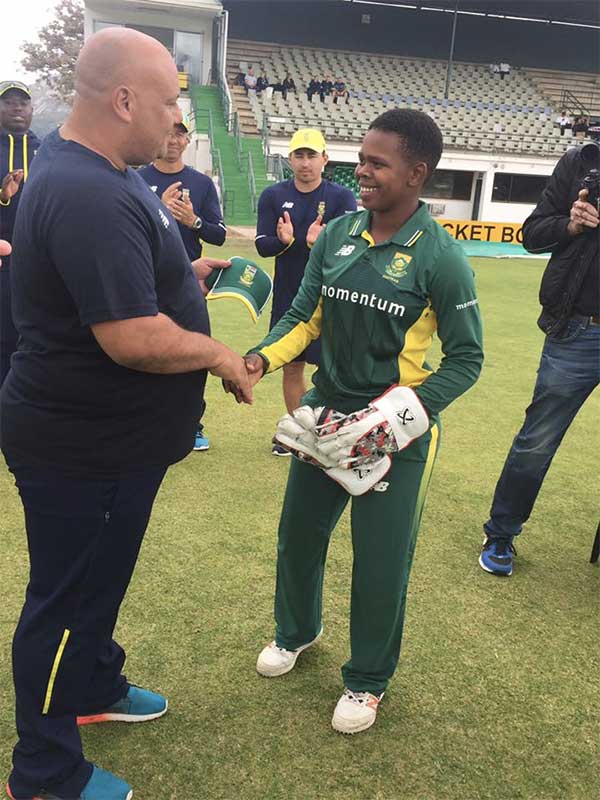
How was your experience sharing the dressing room with senior players?
They are a bunch of calm players and are very supportive. I didn’t feel like I was making my international debut because they put me at so much ease. It was really amazing to share the dressing room with these players and rubbing shoulders with them. I got to learn a lot from them and it also helped me not only become a good cricketer but also a better individual.
What does it take to be a good wicket-keeper?
Fitness is extremely important. Your hamstring and core strength are tested during wicket-keeping. You have to go up and down as well as sideways for every delivery. Apart from physical strength, you need to be mentally strong. You should also have a rhythm and should be able to switch on when the bowler is marking her run up and switch off as soon as you catch that particular delivery.
Which wicket-keeper do you idolize?
Mark Boucher was the one I grew up watching. I wanted to be as quick and agile as him which would help me catch those blinders. I feel MS Dhoni is also an exciting wicket-keeper to watch.
Then, I also look up to Sarah Taylor and Alyssa Healy. I admire their body language. In our Soth African team, I feel grateful that I got a chance to be with Trisha Chetty. She has helped me a lot.
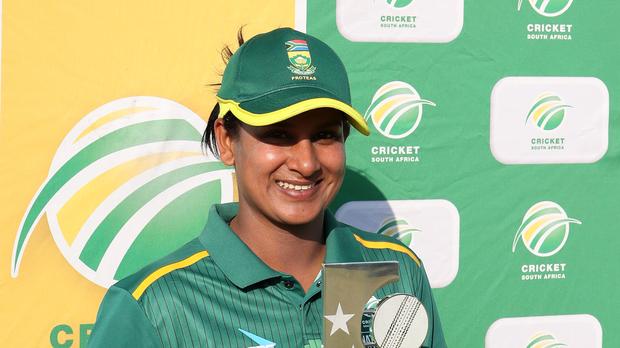
Which bowler do you enjoy keeping wickets for?
I have to say, Shabnim Ismail. She is just so consistent. She gives her 100 percent every ball and wants to bowl each delivery better than the previous one. Her pace is such that it challenges you as a wicket-keeper and keeps you on toes. Watching her bowl is a splendid spectacle as her rhythm is so graceful.
I remember the very first time I kept for her, she bowled a bouncer. It was too hot to handle. Share on X
In 2019, you were selected to play for Devnarain XI in the inaugural edition of the Women’s T20 Super League in South Africa. Tell us about that experience?
Women’s T20 Super League is a wonderful platform for the budding women cricketers in South Africa. There was a good mix of young and senior players. The players got to learn a lot from each other. Considering the rising popularity of T20 cricket, I am happy that in South Africa we have our own super league.
Talking about the T20, this year, South Africa made it to their first-ever World T20 semi-finals. How did you feel about it?
I had goosebumps to see South Africa making it to the semi-finals of the ICC Women’s World T20. I felt really proud of the girls. They worked very hard and truly deserved to be in the semi-finals. I wish the rain had not played the spoilsport in the semi-final against Australia.
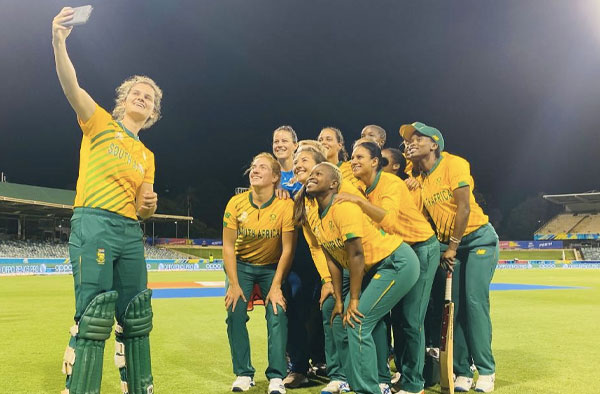
In March, you were awarded a national contract by Cricket South Africa. How important is it for the cricketers?
I feel it is very important for cricketers. It offers you financial stability and security, in addition to encouraging you to pursue cricket as a career. It just plants seeds and you are actually getting paid for your passion and what you love. Hopefully, more and more players make it to the contract system
How does Cricket South Africa help the domestic cricketers?
Cricket South Africa is a vital cog in the South African cricket and takes a lot of effort in supporting domestic cricketers to come up the ranks. Since most of our cricketers are also pursuing education along with cricket, Cricket South Africa helps them with their education and accommodation during their university days. The Board ensures that the cricketers are happy.
What is your ultimate cricketing goal?
I want to have a nice and long career. I want to make an impact in every game I play no matter I feature in 100 games or 50 games. I don’t want to have any regrets when I look back.
I want to also motivate young kids to take up the sport and I want to be a role model as well as a good individual. Post-retirement, I would like to become a motivational speaker.
Any message that you would like to give to the young and budding cricketers?
I would simply say, never give up, there is no shame in failing, but it is important how you pick yourself up after that.
Lastly, tell us about how you are keeping yourself busy in this lockdown?
I am spending time with family and catching up with things that I could not do because of the busy cricketing schedule throughout the year. I am also working on my fitness, particularly core and hip flexibility.
I am playing Xbox FIFA 20 (smiles) which helps me in improving my hand-eye coordination. Share on X
I think soon we will be allowed to go out on the roads and do running. This lockdown is teaching us to be patient and I feel after the quarantine we are going to be “new” people.

Loves all things female cricket